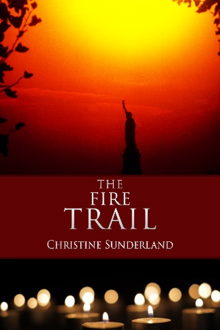By Christine Sunderland
 We are in the season of prophecy, of Advent, in which Old Testament lessons foretell the coming of the Messiah in Bethlehem, and also envision the Second Coming, the Apocalypse, the End of Days when Christ returns “in a cloud with power and great glory.” (Luke 21:25+). A third “Advent” is the coming of Our Lord into our hearts to dwell there. All three advents inform the Christian writer.
We are in the season of prophecy, of Advent, in which Old Testament lessons foretell the coming of the Messiah in Bethlehem, and also envision the Second Coming, the Apocalypse, the End of Days when Christ returns “in a cloud with power and great glory.” (Luke 21:25+). A third “Advent” is the coming of Our Lord into our hearts to dwell there. All three advents inform the Christian writer.
As I reflect on the structure of my next novel, The Music of the Mountain, I listen to the indwelling Holy Spirit in my heart, for the early chapters need to be prophetic ones. Foreshadowing, a cousin of prophecy, will hint at what is to come. Questions will be asked that need answering. Suffering will need healing. Loneliness will need love, despair hope, unbelief belief. As human beings we eagerly search for patterns in our own life plot. We search both in life and in stories, so that we can create meaning and purpose, can make sense of our world.
In Angel Mountain (Wipf and Stock, 2020), pages are turned to discover the meaning of the earlier foreshadowing. An earthquake unsettles not only the earth but those characters who fear the sudden disruption. We sense the novel will be about Heaven and Earth, and this is reinforced when we are introduced to Hermit Abram living in a cave on Angel Mountain, a John the Baptist figure preaching to crowds in the meadow below.
foreshadowing. An earthquake unsettles not only the earth but those characters who fear the sudden disruption. We sense the novel will be about Heaven and Earth, and this is reinforced when we are introduced to Hermit Abram living in a cave on Angel Mountain, a John the Baptist figure preaching to crowds in the meadow below.
Theoretically, each early detail, including backstory threads, foretells the major plot arc and theme. These moments are sometimes referred to as “set-ups” and “pay-offs.” When set-ups are not paid off later, the reader is disappointed and frustrated, for chaos and meaninglessness has replaced order and discovery in the plotting.
Just like God’s plot arc for each one of us, we desire our stories to make sense of our world, to give meaning to our lives. And so these hints on the pages about what will happen later reflect the wholeness of creation, God’s moral order and design, an order disrupted by Adam.
We often desire to turn the pages in our own lives to see our future. When we turn the pages in fiction to find out what happens next we are answering this deep need common to all humanity.
This is the great power of storytelling – to reflect reality, the reality of who we are and who we are meant to be. In a sense every story is a parable on some level. As children we listen to, and later read, fairy tales embedded with meaning. We learn what makes a hero or heroine, and why, and how to strive to become one. We learn not to “cry wolf” and that even a mouse can tame a lion. We learn about true love, that it demands courage and sacrifice. We learn not to enter the dark forest where danger lurks. And probably most of all, we learn to listen to our elders, those who are reading such magnificent stories to us (or with us). At an early age, we are told stories that prophesy our future choices and what those choices mean, the plot of our lives. These hints and guesses of our future days and years mold us to be holy children of God.
With the twentieth century’s denial of God the hero was replaced with the anti-hero. Love became lust. Goodness was ridiculed. Family life was portrayed as harmful. Characters became diagnosed, their parts separated by Freudian analysis and told to live in the moment. Writers wrote within this “Existentialist” framework, with no plot arcs, no heroes, no stories that inspire and teach and mold. Readers were left with a nihilistic world vision. Today, this is largely the picture we see in modern (secular) fiction. The reader is not inspired by what transpires for the natural moral order has been abandoned, even buried, and a new order of self and desire has supplanted it.
It is no wonder that Christian fiction has largely avoided the present day as a time setting. Setting stories in the past where within an accepted moral framework allowed good to triumph over evil, heroes to slay dragons, truth to be cherished, God’s commandments to be recognized as laws to be obeyed. These examples mentored us.
 My own stories are set in the present in a brave (perhaps foolhardy) attempt to infuse our current culture with artistic meaning and moral boundaries. While history pervades backstories and characters’ current interests, the setting is today, in our godless culture, and characters must deal with the issues you and I are dealing with each day. In The Fire Trail (eLectio, 2016), the opening pages describe a crime committed in the hills above U.C. Berkeley. We know this will be a central issue – criminal justice or injustice and the safety of students at a major university. Other foreshadowings are sprinkled through the early pages, as though the novel were a canvas painted with broad brush strokes hinting at the direction the story will take: Nine-Eleven, Western Civilization, the importance of history, the Judeo-Christian founding of our country, libraries and books.
My own stories are set in the present in a brave (perhaps foolhardy) attempt to infuse our current culture with artistic meaning and moral boundaries. While history pervades backstories and characters’ current interests, the setting is today, in our godless culture, and characters must deal with the issues you and I are dealing with each day. In The Fire Trail (eLectio, 2016), the opening pages describe a crime committed in the hills above U.C. Berkeley. We know this will be a central issue – criminal justice or injustice and the safety of students at a major university. Other foreshadowings are sprinkled through the early pages, as though the novel were a canvas painted with broad brush strokes hinting at the direction the story will take: Nine-Eleven, Western Civilization, the importance of history, the Judeo-Christian founding of our country, libraries and books.
We are Christian novelists who have been given a prophecy of great joy. We know our world suffers, as the world has suffered since Adam, but too many suffer without prophecy, without hope. As Christians who write about the Word made flesh who dwelt among us, we can read the signs of the times. We see meaning in one another, foreshadowed in a child’s first words, prophecy spoken by elders, mothers, and fathers in the faith. In the midst of death (of belief, of law, of love, of life itself) we know a better way, a truer way.
As we celebrate Christmas, we must give thanks that we are immersed in the greatest story of all, the story of Emmanuel, God with us – his birth, life, death, and resurrection, the redemption of the world, the salvation of those who believe in the Savior himself. We are people of the Book, immersed in Scripture, the past and present merging in our liturgies and litanies. And when this past and present merge, we see the future in signs given us. For Christ said,
story of Emmanuel, God with us – his birth, life, death, and resurrection, the redemption of the world, the salvation of those who believe in the Savior himself. We are people of the Book, immersed in Scripture, the past and present merging in our liturgies and litanies. And when this past and present merge, we see the future in signs given us. For Christ said,
“AND there shall be signs in the sun, and in the moon, and in the stars; and upon the earth distress of nations, with perplexity; the sea and the waves roaring; men’s hearts failing them for fear, and for looking after those things which are coming on the earth: for the powers of heaven shall be shaken. And then shall they see the Son of man coming in a cloud with power and great glory.” Our Lord Jesus Christ, Luke 21:25+, The Gospel appointed for the Second Sunday in Advent, 1928 Episcopal Book of Common Prayer
We are a people of prophecy. We write our stories to reflect this connection with past and present and future. In our stories we foretell the joy of Christ, the joy of life, the joy of being reborn again and again. We offer hope to a world of despair.
Christian novelists prophesize, foreshadowing major plot arcs, and thus satisfy the desire for meaning and making sense of God’s world – past, present, and to come. @ChristineSunderland #ACFWBlogs #writetip #critiques #ACFWCommunity Click To Tweet Christine Sunderland has authored seven award-winning novels: Pilgrimage, set in Italy, Offerings, set in France, Inheritance, set in England, Hana-lani, set in Hawaii, The Magdalene Mystery, set in Rome and Provence (all Oaktara), The Fire Trail (eLectio), set at UC Berkeley, and Angel Mountain (Wipf and Stock), set on Mount Diablo, east of Berkeley. She serves as Managing Editor for the American Church Union and is a member of the Anglican Province of Christ the King. Visit Christine at www.ChristineSunderland.com (website and blog) and www.fictionfinder.com/book.
Christine Sunderland has authored seven award-winning novels: Pilgrimage, set in Italy, Offerings, set in France, Inheritance, set in England, Hana-lani, set in Hawaii, The Magdalene Mystery, set in Rome and Provence (all Oaktara), The Fire Trail (eLectio), set at UC Berkeley, and Angel Mountain (Wipf and Stock), set on Mount Diablo, east of Berkeley. She serves as Managing Editor for the American Church Union and is a member of the Anglican Province of Christ the King. Visit Christine at www.ChristineSunderland.com (website and blog) and www.fictionfinder.com/book.
